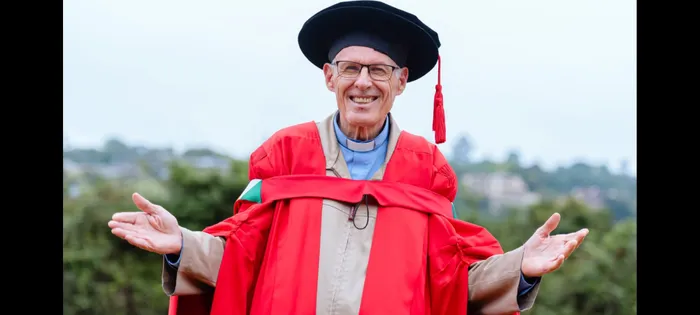Parish priest, 74, graduates with doctorate

Parish priest, Dr Pierre Goldie graduated at the age of 74 with a Doctor of Philosophy in Catholic Theology. Picture: SUPPLIED
Guided by the holy spirit, Dr Pierre Goldie, graduated with a Doctor of Philosophy degree in Catholic Theology, at the age of 74.
He was the oldest student to graduate at the 2024 Autumn Graduation Ceremony at the University of KwaZulu-Natal (UKZN).
Parish Priest Goldie’s academic journey culminated in an investigation into the evolving perception of sacred power among black, urban, isiXhosa-speaking Catholics within the Catholic Archdiocese of Cape Town. Dr Goldie’s thesis critically discerns the image of God in relation to ancestral figures amid ongoing cultural change.
According to Dr Goldie, his research sought to understand the appropriation of Catholicism, and evaluate its success and challenges within this context. Focused on identifying sources of sacred power, he examined how perceptions of “God” have shifted over time, and the implications for religious consciousness.
“Central to my findings is the displacement of ancestral figures from their dominant role by the figure of ‘God’ within the urban isiXhosa-speaking Catholic community. While the ancestors historically held primary sacred power, ‘God’ now commands religious consciousness, albeit with continued reverence for ancestors. Conspicuous undervaluation of the Christ figure is theologically challenging, especially for the Catholic Church,” said Dr Goldie.
The study considers the dual religious system at play, where parishioners navigate both African indigenous beliefs and Christianity for existential solutions. It enriches understanding of religious identity and sacred power dynamics within contemporary African Catholic communities, he added.
To navigate the complex interplay between African traditional beliefs and Catholic practices, Dr Goldie employed a meticulous methodology rooted in Catholic criteria while validating indigenous notions of sacred power as far as possible, according to Catholic criteria.
“The significance of displacing ancestors underscores a fundamental transformation within Catholicism, and Christianity in general. ‘God’ now offers a closer, more accessible source of sacred power, challenging the distant, intimidating perception of the divine prevalent in African traditions,” Dr Goldie said.
Aware of his own conditioning “biases” and lens, which he guarded against in his study, Dr Goldie said he appreciates the importance of culture and the fact that indigenous people view the world through their own cultural lens. He said they were encumbered with their own existential problems for which they look for resolution from both indigenous religion and Christianity, whichever yields positive outcomes.
He added that this calls for deeper appreciation of cultural nuances within religious discourse. Dr Goldie hopes his study will influence conversations within the Catholic Church and academic circles to bridge cultural gaps and rekindle meaningful engagement with African contexts.
Reflecting on his academic journey amidst his parish responsibilities, Dr Goldie emphasised the importance of ethical considerations and prayerful guidance in theological research.
He expressed gratitude to God, his two supervisors, Professor Paul Decock and the late Professor Stuart Bate; the Cape Town Archdiocese Archbishop and Cardinal Stephen Brislin, all the South African contributors to the field of indigenous culture and religion, and the many missionaries and priests in the Catholic Church.